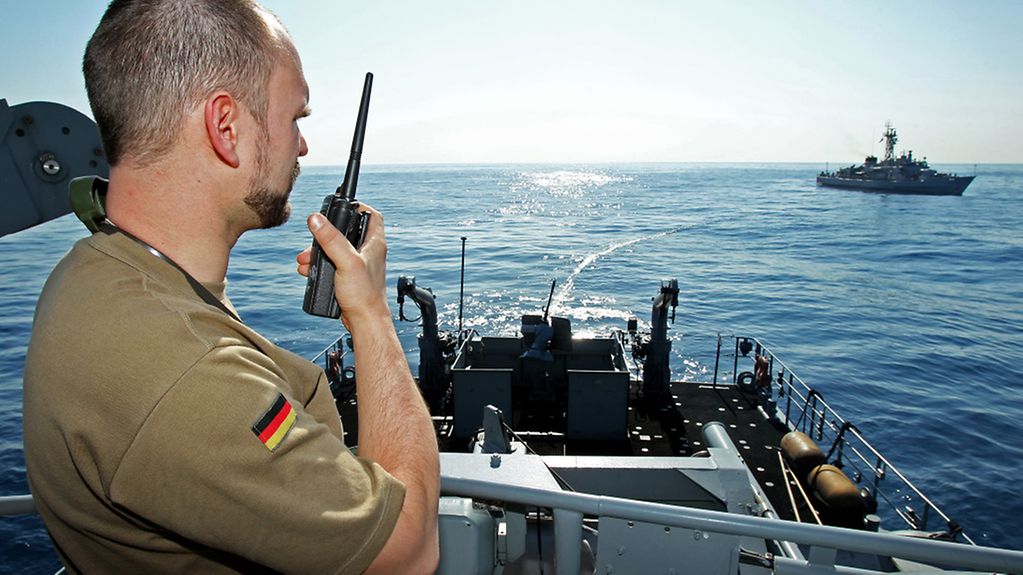Bundeswehr foreign missions
German soldiers will continue to be part of operations in Kosovo, Mali and off the Lebanese coast. The Cabinet has decided to extend the three mandates for these foreign missions. The motions must still be approved by the German Bundestag.
4 min reading time

A minesweeper off the Lebanese coast. The Cabinet has decided to extend the UNIFIL mandate.
Photo: Sebastian Wilke/Bundeswehr
The Bundeswehr has already been in Kosovo since mid-1999. The deployment as part of Kosovo Force (KFOR) is to be continued unchanged. German troops will also continue to be involved in the United Nations Interim Force in Lebanon (UNIFIL) mission and in the United Nations Multidimensional Integrated Stabilization Mission in Mali (MINUSMA).
Stable situation in Kosovo
The mission in the Republic of Kosovo is to be extended unchanged, with a maximum of 1,850 soldiers deployed. The situation in Kosovo is largely peaceful and stable, although the potential for conflict remains high in the north of the country, where the majority of the population are Kosovo Serbs. The presence of international troops is still needed to ensure security and stability.
The Bundestag mandate for the involvement of Germany’s armed forces is not limited in time, but the government will nevertheless submit a motion to the German Bundestag, requesting its approval for the extension of the mandate.
Relations between Serbia and Kosovo
In April 2013 Serbia and Kosovo concluded an agreement to normalise relations between the two countries. It provides for the gradual dissolution of Serbian parallel structures, especially in northern Kosovo, and for these to be integrated into Kosovar structures. The aim is to achieve one single judicial area throughout Kosovo. Important landmarks have already been achieved in the implementation of the agreement, but until relations between the two countries are permanently stable, KFOR (Kosovo Force) will have to support the process closely.
Development cooperation with Kosovo
Development cooperation with Kosovo began in 1999. German assistance, which totals over 480 million euros to date, does much to support the country’s social and economic development. For 2015, assistance of 25.5 million euros is planned, to extend the country’s energy grid and to improve water supply and sanitation.
United Nations Interim Force in Lebanon (UNIFIL) off the Lebanese coast
Armed German forces will also continue to be involved in the UN-led UNIFIL mission (United Nations Interim Force in Lebanon). The Cabinet decided to extend the mandate unchanged until 30 June 2016 with up to 300 soldiers deployed off the Lebanese coast.
Securing Lebanon’s borders
Lebanon’s sea borders are to be secured. Arms and other war materials are only to be allowed into the country with the authorisation of the Lebanese government. The capabilities of the Lebanese navy are also being developed. Lebanon is to be enabled to secure its own borders in future.
UNIFIL is making an important contribution toward normalising relations between Israel and Lebanon. At international level too UNIFIL is seen by all sides as an important factor in ensuring stability in the region. Both Israel and Lebanon appreciate Germany’s engagement and specifically attach importance to its continuation.
Refugees taken in by Lebanon
The conflict in Syria and the unchecked flows of refugees from the neighbouring state continue to seriously jeopardise security in Lebanon. The threat posed by the terrorist organisation Islamic State in the region is also worsening. Lebanon still needs international support to help it master these challenges.
To help Lebanon cope with the waves of refugees, Germany has provided the country with about 247 million euros since 2012. Of this sum, about 59 million euros have taken the form of humanitarian aid supplied by the Federal Foreign Office, while development-oriented transitional aid worth 188 million euros has been channelled through the Federal Ministry for Economic Cooperation and Development.
More than one million people have fled to Lebanon. Compared to its population Lebanon has taken in more refugees than any other country in the world.
Mali mission also extended
The Cabinet has also decided to extend the mandate for the deployment of armed German troops as part of the United Nations Multidimensional Integrated Stabilization Mission in Mali (MINUSMA). Mali is to be enabled to ensure security and maintain its sovereignty independently. The mandate is to be extended until 30 June 2016 with an unchanged ceiling of 150 troops.
Steps toward stabilisation
Progress has been made with the crucial political process in Mali that is so vital to stabilise the situation on a lasting basis. Brokered by Algeria, a peace agreement has been elaborated, which has been signed by the government but not by all parties involved. To stabilise the security situation and the political process on the future status of northern Mali, the mission is still essential. It also ensures that humanitarian actors retain access to the country.
The mission is part of the German government’s wide-reaching engagement for Mali within the scope of a networked approach, including crisis prevention and development cooperation. Equipment assistance and training for police and security forces are also being provided within the scope of European Union and United Nations missions.